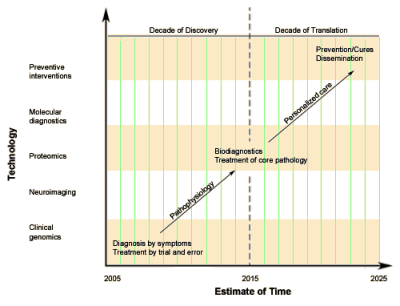Balancing Immediate Needs with Future Innovation
NIMH Director’s Blog
by Thomas Insel
January 26, 2012NIMH, like all Institutes at NIH, has an advisory council that meets three times each year. The National Advisory Mental Health Council [NAMHC] is a distinguished group of scientists, advocates, clinicians, and policy experts. Each of our meetings includes a closed session to review individual grants considered for funding and a session open to the public that engages this diverse group in discussions about the larger issues that guide NIMH funding.At last week’s session, we heard a recurrent tension around one such larger issue. Some members of Council bear witness to the poor quality of care, the unmet medical need, and the diminishing investments by states on behalf of people with mental disorders. They reasonably ask, “How are we ensuring that the science that NIMH has produced is implemented where the need is greatest?” They also question on the pay-off of genetics research. After all, two decades after the gene for Huntington’s disease was identified, we still have no effective treatments, and Huntington’s disease is genetically far simpler than schizophrenia or bipolar disorder. In contrast to so many neurological diseases, we have effective treatments for schizophrenia and bipolar disorder. NIMH should be investing to ensure these are available.
The opposing argument runs something like this. There has been no major innovation in therapeutics for most mental disorders since 1960. Current treatments are not good enough for too many. Rather than investing scarce dollars for incremental improvements or increased dissemination of mediocre interventions, we need invest in the fundamental science of brain and behavior so that we can understand how to develop better treatments.
While I may have oversimplified the two sides of this debate, the divide is substantial. Some advisors want more funds in services research; other advisors want more funds in basic neuroscience. Some are thinking of the immediate needs; others are focused on the paradigm shifts that may be revealed by another decade of research. And with the NIMH budget stretched, tough choices must be made…

“We have effective treatments for schizophrenia.” Really?
Way back when, in organizational development circles, we used to discuss designing “preferred futures” – of systems, professions, organizations, etc. I’m interested in learning about KOLs’ thinking about a preferred future for mental illness approaches: who should be the societally sanctioned professionals, who is the captain of the ship, how should patients be approached – should diagnosis still be a primary function; what about the type of relationship patients have with physicians and other treaters – what should those characteristics be; and on to treatment modalities, etc.
The KOLs I’m referring to aren’t the designated hitters of pharma and 3rd parties, but the bell ringers, such as found here and on progressive science-based blogs, such as Emily Deans, Daniel Carlat and Steve Balt’s, plus the informed patient and journalism front – the Robert Whitaker, Alison Bass, University Diaries, Health Care Renewal type investigational reporting blogs.
I think Whitaker is beginning to move into the direction of activism, but so far, I don’t see any physicians and nurses going that route. However, only a social contract gives disciplines the right to refer to themselves as professions, determine their scope of practice and self-regulate. At some point, psychiatry and psychiatric nursing are going to have to come to terms with this. If not, I think patients will rightly abandon them and go in another direction (not saying this is undesirable, just forecasting a bit).
We all are driven to avoid threat and respond to rewards. It may be that psychiatry is at a critical tipping point relative to threats/rewards. ;^\
As always, Dr. Nardo, a wonderful post as nutrition for the cranium. Thanks.
To Tom and aek: Amen! And, yes, Dr. Nardo, nutrition for the cranium. Love that quote.